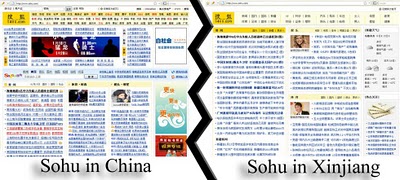In a typically excellent column, Gady Epstein, the good Forbes columnist (and Beijing bureau chief), looks at Hillary Clinton’s remarks yesterday on Internet freedom, China’s predictably prickly reaction to them, and the effect this all might have on the future of Google in China (as well as the broader issue of Internet freedom in China). I like the way he frames the issue:
Authoritarian regimes have adapted to the Internet, giving people enough freedom online that most have not resisted censorship and controls. Google.cn was, insidiously, a part of that success in China, stamping an authoritarian system of self-censorship with the Google brand of legitimacy.
Google wants to grab that brand back. Having the U.S. on its side may not help the company’s short-term commercial interests, and it may well embolden hard-liners in China’s government. But as Clinton alluded to Thursday, the U.S. has a brand to protect as well. Many in the world still look to the U.S. for leadership on principles, and the Internet needs it.
“On their own, new technologies do not take sides in the struggle for freedom and progress,” Clinton said. “But the United States does.”
Of course this fight is about much more than China vs. the U.S, or even China vs. Google. It is about a future of nation-states, corporations and other nonstate actors struggling to define liberty on the Internet. The U.S. and Google being on the same side of that struggle? I see that as a good thing.
I do, too. He also links to a must-read column in the Global Times (which he refers to, not without some justification, as “the Communist Party’s new McPaper aimed at foreigners”) that shows us where this is heading – the usual accusations and counter-accusations between the US and China, which threaten to drownout the actual issue of cyberfreedom. I found the GT piece disappointing considering how well the McPaper started off when this issue arose last week:
Google’s “New approach to China,” as spelled out in the title of its recent statement, would do no good to China, either. Should the world’s most populous nation fail to provide a foothold to the world’s top search engine, it would imply a setback to China and serious loss to China’s Net culture. The information highway demands not only safe driving but also free flow of traffic. And, in the interests of the majority’s right to know, free flow of information should take precedence in a civil society.
n a transitional society like China, the existence of censorship can be justified as allowing full play to multifarious and disorderly search results poses unprecedented risks to vulnerable netizens and social stability.
But the government must face up to the challenge of where and how to put the checkpoints on the highway. A sensitive and shrewd government should have the vision and savvy to place the right kind of checkpoints at the right place and at the right time for ensuring the free flow of highway traffic as much as possible in the public.
It almost sounds like a non-Chinese paper! Well, that relatively restrained and objective approach was nice while it lasted. The column Epstein points to today is somewhat less open-minded.
Unlike advanced Western countries, Chinese society is still vulnerable to the effect of multifarious information flowing in, especially when it is for creating disorder.
Western countries have long indoctrinated non-Western nations on the issue of freedom of speech. It is an aggressive political and diplomatic strategy, rather than a desire for moral values, that has led them to do so.
The free flow of information is an universal value treasured in all nations, including China, but the US government’s ideological imposition is unacceptable and, for that reason, will not be allowed to succeed. China’s real stake in the “free flow of information” is evident in its refusal to be victimized by information imperialism.
Oy. Information imperialism indeed. Anybody can put anything they want up on the Internet. The only ones who get hysterical about it are those who are insecure and frightened. You know, sticks and stones….
I loved Hillary’s line, “On their own, new technologies do not take sides in the struggle for freedom and progress. But the United States does.” I thought she could have gone further in her speech, but then again, diplomacy is what she’s there for, and that she went as far as she did was enough to whip the CCP into its signature apoplexy. Let’s hope the back-and-forth is short-lived, and that it helps lead to at least some improvement of cyberfreedom in countries that fear it. As Epstein eloquently noted,
The world’s leading superpower and the world’s leading Internet company have made a clear statement that fundamental freedoms–of expression, of assembly–must apply in cyberspace. They have taken note that, as Clinton said Thursday, these freedoms won’t flourish on their own, despite techno-Utopian predictions to the contrary.
So this dialogue is a good thing. The Great Firewall isn’t coming down, not anytime soon, but this adds to the pressure that one day might lead to its long-awaited passing.

Comments